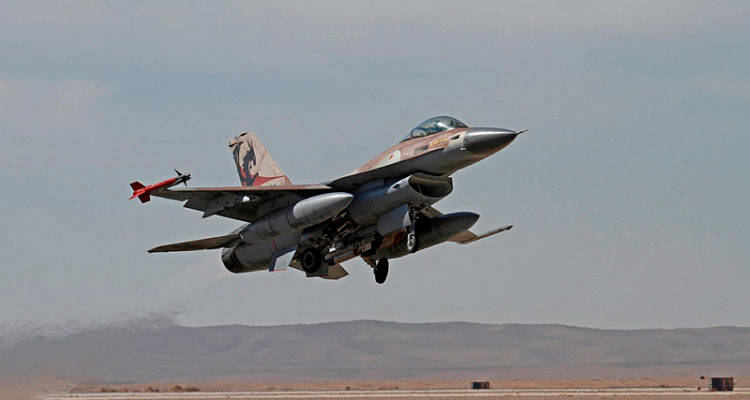“We have moved from blocking Iran’s entrenchment in Syria to forcing it out of there, and we will not stop,” commented Minister of Defense Naftali Bennett this week.
By Aryeh Savir, TPS
The Israeli Air Force (IAF) attacked several targets in Homs on Friday morning, following Thursday night strikes in southern Syria adjacent to the Golan Heights that hit Iranian forces and Hezbollah operatives.
The IAF hit a munitions depot in Homs used by the Hezbollah terrorist organization after midnight on Thursday.
Syria state media claimed that the explosions were the result of a “human error” caused by troops moving ammunition.
However, the Syrian Observatory of Human Rights (SOHR) said that the Syrian missile defense system was activated during the strike, meaning that the Syrian air defenses were responding to a missile attack.
At least 10 civilians were wounded outside the warehouse, according to eyewitness reports quoted by the SOHR. There were no available reports of injuries to troops or Hezbollah operatives in the warehouse.
On Thursday night, Syria’s official SANA news agency reported that an attack was launched from Israel on targets in southern Syria, causing material damage to structures.
The SOHR reported that the targets were Iranian-led Hezbollah units in the Tel Ahmar area south of Quneitra in southern Syria, adjacent to Israel’s border with Syria.
The SOHR noted that Israeli helicopters hit three different sites that Hezbollah was using to set up bases along the border.
Israel has previously bombed Hezbollah and Iranian infrastructure under construction in the area.
The IDF in March 2019 announced that it had exposed a clandestine Hezbollah unit that was operating in southern Syria in the area near the border with Israel and where the attacks occurred.
The unit’s objective is to establish another front against Israel from the Golan Heights, in addition to the threat Hezbollah poses from Lebanon.
The IDF recently published previously classified information about the “Golan File,” which refers to the unit attempting to establish military infrastructure on Israel’s border. The infrastructure is at its preliminary stages, still in the process of development and consolidation, and has yet to reach the level needed for operational activity.
Israel has reportedly carried out several attacks inside Syria in recent weeks.
While Israel has refrained from publicly commenting on the reports, Minister of Defense Naftali Bennett stated during an interview on Tuesday that the IDF was determined to drive the Iranians out of Syria.
“We have moved from blocking Iran’s entrenchment in Syria to forcing it out of there, and we will not stop. We will not allow more strategic threats to grow just across our borders without taking action,” he stated. “We will continue to take the fight to the enemy’s territory.”
Iran seeks to establish bases, with Syrian’s blessing, along Israel’s northern borders. Israel has long maintained that it will not allow Iran to establish a new threat on its borders.
Israel is also trying to prevent Iran from providing Hezbollah with advanced weaponry, specifically precision-guided missiles.
In general, Iran’s military build-up in Syria remains a red line for Israel. The IAF has carried out thousands of attacks to thwart the Iranian entrenchment in the war-torn country.
